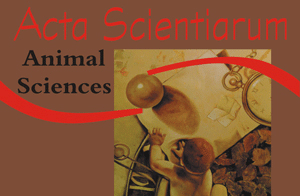ABSTRACT.
This study aimed to evaluate the effects of different levels of dietary fiber on the performance and egg quality of laying hens at pre-laying and laying peak periods. The experimental period was divided into three periods: pre-laying (16 to 19 weeks of age), the start of laying (20 to 22 weeks of age) and laying peak (23 to 28 weeks of age). The experimental design was completely randomized with treatments constituted by five levels of fiber (2.00, 2.50, 3.00, 3.50, and 4.00%) in the diets, with five replicates (pens) of six birds each, totalling 180 hens. Performance and egg quality results were evaluated by polynomial regression at 5%. Fiber levels were not influenced (p >0.05) the first laying of the hens. However, levels above 2.50% of fiber provided worst (p <0.05) performance results, regardless of the period evaluated. Shortly after the start of laying, higher levels of fiber also caused a linear reduction (p <0.05) on egg weight and percentages of yolk and albumen, and an increase (p <0.05) on eggshells. Higher fiber levels caused a linear reduction (p <0.05) in the quality of the eggs, regardless of the period evaluated. It was concluded that the fiber levels did not influence the start period of the laying. Both pre-laying and start of the laying, levels above 2.5% of fiber caused a gradual worsening in performance. From the start of laying up to laying peak, levels above 2.5% of fiber also caused a gradual worsening in egg quality.
Keywords:
animal nutrition; eggshell; egg weight; feed intake; poultry
